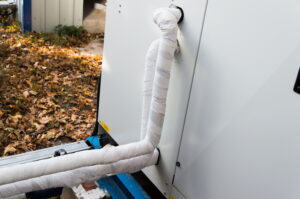 There are many problems that can impact a home that you might classify as “minor.” It’s true, some problems aren’t very big. However, when it comes to your air conditioning system, there’s no issue that you’ll want to just brush off without having a professional at least look at your system. Refrigerant loss is one of those problems.
There are many problems that can impact a home that you might classify as “minor.” It’s true, some problems aren’t very big. However, when it comes to your air conditioning system, there’s no issue that you’ll want to just brush off without having a professional at least look at your system. Refrigerant loss is one of those problems.
Refrigerant is the component that literally makes the cooling process possible. If you have reason to believe that your system is losing refrigerant, it’s time to give us a call. The longer you wait to do so, the bigger risk there is of serious damage happening to your AC—most likely to the compressor, which is the heart of your cooling system. But, how do you know if your system is losing refrigerant? And why does it matter?
Signs of a Refrigerant Leak
There’s a common misconception among homeowners that refrigerant is something that runs out naturally, like gasoline from a car. Refrigerant is not a fuel, though. It’s a liquid that is continually put through a process where it changes to a gaseous state and back.
Your air conditioner is supplied with enough refrigerant upon installation to ideally last the system’s whole lifespan. If you have refrigerant loss, it means you have a refrigerant leak, which must be located and repaired. So, how do you know you have a leak?
- Warm Air. You should take note of whether or not the air doesn’t seem cool, or if it’s that the airflow isn’t as powerful. The latter can be an indication of another problem entirely. You should still call our team for help, but low airflow isn’t necessarily a sign of refrigerant loss.
- Short Cycling. Short-cycling is the term given when an air conditioner (or central heater) is cycling on and off in rapid cycles instead of completing a full cooling cycle. Short-cycling is not only a possible symptom of refrigerant loss, but can also cause exacerbated wear and tear on the system, too.
- Increased Energy Bills. When you have refrigerant loss, your air conditioner has to run longer in order to try to reach the desired temperature you set on your thermostat. This is inefficient, and as a result you’ll use more energy and your utility bills will spike. If you ever notice that your energy bills are drastically higher than they were the same time the year prior, despite comparable use, it’s almost always a sign that something isn’t working as efficiently as it should, and your air conditioner could very well be the culprit.
- A Hissing or Bubbling Noise. What you’re actually probably hearing is refrigerant leak out, either in liquid or gas form.
- Ice Forming on the Coils or Refrigerant Line. Ice is never normal to see on your air conditioner. We get it—it’s a system that chills the air, so you’d think this was okay, but ice causes a number of problems for your AC operation and can even lead to system breakdown.
When you need quality central AC repair in St. Augustine, FL, look no further than Climate Masters. Contact us today!







